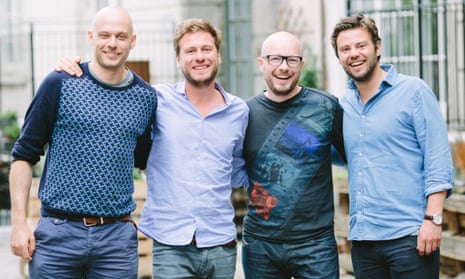With its continuous flow of dark Danish TV dramas, these days Copenhagen is commonly known as the backdrop of The Killing, The Bridge and Borgen. But away from its captivating Scandi crimes, the city’s tech startup scene is making a name for itself as an ecosystem worth watching.
The startup community can attest to the achievements of Danish tech entrepreneurs. Online takeaway service Just Eat, now based in London and which floated on the stock market in 2014, is a Danish success story. Meanwhile, Copenhagen’s tech community is quick to emphasise that Skype co-founder Janus Friis is Danish.
But Danes don’t need to just look back to find their success stories: wine app company Vivino, employee engagement and retention tool Peakon, and consumer review platform Trustpilot are three of the city’s current crop of high-flying startups.
“The Danish and Copenhagen tech scene has a long history of making a strong contribution to the global tech scene with programming languages Ruby on Rails, C++ and PHP all created by a Dane,” says Neil Murray, founder of The Nordic Web, a website that provides analysis on the startup scene across the region.
“However, until a couple of years ago the startup scene was very dispersed, and companies such as Just Eat and Zendesk [a customer service software company] had no choice but to locate themselves elsewhere in order to succeed.”
He says, however, that within the past couple of years Copenhagen’s startup scene has become more joined up. Co-working spaces include Rocket Labs and Founders House, as well as #CPHFTW, a non-profit organisation promoting and bringing together the city’s tech startups as well as a grassroots movement. The community spirit has even created a main tech hub, Startup Village, at Islands Brygge.
The Danish startup scene, which has a focus on business-to-business enterprise, is certainly attracting the attention of investors. In 2015, The Nordic Web tracked 65 investments worth $273.5m (£192.2m) in Danish startups – up from 38 in 2014. It predicts more than 100 investments in Danish startups in 2016.
Murray says the money is predominantly coming from venture capitalists, with Seed Capital the most active of the local firms, and Sweden-based Northzone and Denmark investors Northcap and Sunstone also particularly active. However, their investment isn’t hitting a wide range of Danish startups: 84% of the funding was invested in 10 companies, with Trustpilot receiving an impressive $73.5m (£51.7m) and software firm Siteimprove raking in $55m (£38.7m) in 2015.
“Every year we invest in two to three Danish companies, with the past year seeing the number increase to five,” says Nikolaj Nyholm, partner at Copenhagen-based venture capital firm Sunstone Capital, whose investments include Peakon. “We are now seeing the results of the previous years’ increased startup activity and would not be surprised if the number increases. For a long time the repeat entrepreneurs had their roots in the dotcom era of 1998 to 2001, but fortunately we are finally being pushed aside by a new crop of repeat entrepreneurs creating great products like Peakon.”
So why is the Copenhagen tech ecosystem taking off? “There’s a lot of talented people and a good education system,” says Dan Rogers, co-founder of Peakon. The company was formed by four influential names in the tech startup sector, including Podio co-founder Kasper Hulthin, on a summerhouse in Rørvig, Denmark last year. However, Rogers says Copenhagen lacks “a strong history of startups”, adding that “good startups breed more good startups”.
This is reiterated by Rasmus Makwarth, co-founder of Opbeat, a platform for developers that has received substantial investment over the years including $250,000 from a group of high-profile angel investors including Instagram co-founder Mike Krieger and Facebook co-founder Andrew McCollum.
“Denmark as a tech ecosystem is so small that there’s few people to ask for advice and that’s what’s been missing,” says Makwarth at his co-working space over in Startup Village. However, he’s upbeat following the emergence of more serious players in the city in recent times.
Makwarth says some entrepreneurs don’t return to the Copenhagen startup scene after selling their venture, but the founders of Podio have stayed and founded Peakon.
He says: “Having people around who have succeeded and sold is vital to the ecosystem. We don’t have the American dream embedded in our culture so we need someone to push us.”
Visit any startup in Copenhagen and you’re bound to find international employees from across the globe. Denmark has appeal as the third happiest nation in the world, with strong healthcare and childcare benefits and a focus on work-life balance.
Still, despite the sturdy social welfare system, one of the key challenges for the tech startup system is the lack of risk-taking in the city. “While there’s a lot of ambitious Danish startups, in other cities such as London everyone is fighting for survival, which pushes the boundaries. Here people have it more comfortable,” says Rogers.
Christoffer Malling, head of #CPHFTW, agrees. “A lot of Danes stick to corporate jobs rather than taking a risk.” Some say the government has not been as supportive of the tech community as it should be, although Murray says interest and support from the government is slowly increasing, adding that before 2014 startups needed 80,000DKK (£8,389) in capital to register a company, whereas these days it is just 1DKK (10p).
Still, Malling has grand designs for Copenhagen’s startups. “We are very ambitious,” he says. “We are the next major European tech startup hub [...] now we have the business climate, the capital, the people, the community builders. By 2020, Copenhagen will be regarded as a major tech hub.”
Sign up to become a member of the Guardian Small Business Network here for more advice, insight and best practice direct to your inbox.

Comments (…)
Sign in or create your Guardian account to join the discussion